- Find the oil drain plug and remove it to drain the old oil.
- Pour in the right amount of new oil recommended by the manufacturer.
- Make sure to use oil made for pressure washer pumps.
- Put the drain plug back in securely.
- Run the pressure washer for a bit to spread the new oil around.
Introduction

It is never exaggerated to say that a Pressure Washer Pump Oil Substitute plays a pivotal role in maintaining a high-performance and efficient pressure washer. Regularly changing your pump oil will keep it in top condition, guaranteeing you the cleaning power needed for different applications such as washing your car or deep-cleaning dirty outdoor surfaces.
But what if you run out of pump oil or it’s not readily available? Fear not, DIY enthusiasts—this blog post dives into the realm of pressure washer pump oil substitutes.
Understanding the Basics of Pressure Washer Pump Oil
To begin with, one must get back to the basics before moving on to the alternatives. This type of oil is not similar to other types, which are common motor oils. Instead, it has been specifically formulated in order to withstand the high pressures present within these machines.
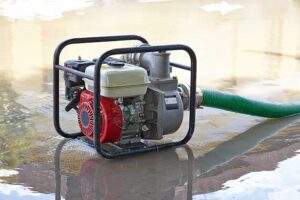
The purpose of this substance is to provide lubrication for the seals and pistons on a pump, thus preventing wear and tear so that it lasts longer.
Types of Pressure Washer Pump Oils Available
There are usually two types of pressure washer pump oils on the market:
- Conventional: These ones protect only at a basic level and tend to be quite affordable.
- Synthetic: They are manufactured to perform under extreme conditions and also generally last longer.
Both types come in different viscosity grades, and it’s vital that you adhere to the recommended type and viscosity by the manufacturer for your particular model.
The Significance of Regular Maintenance and Oil Replacement
A damaged pump that needs replacement may result from a failure to keep a check on water pressure loss, leakages, etc. Just like your car, regular oil changes can enhance its performance, but most people omit them.
Alternatives to Traditional Pressure Washer Pump Oil
So what do DIYers do when they don’t have access to pressure washer pump oil? Here are four substitutes who can still do the job:
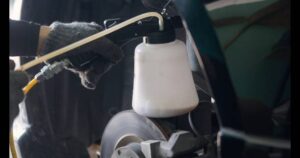
Auto mechanic replacing brake fluid on a vehicle, technician bleed air out of disc brake system in garage workshop, Car repair in a car service
Automatic Transmission Fluid (ATF)
As far as DIYers’ are concerned, automatic transmission fluid is a popular selection for pressure washer pump oil. It’s readily available, and its high viscosity makes it able to withstand the high pressures within this machine. However, not all pressure washer models may be able to use ATF; hence, cross-checking is important.
Synthetic motor oil as a substitute
The most frequently chosen among them is synthetic motor oil with properties that could closely mirror those of traditional types of pump oil.
- Advantages and Disadvantages: Synthetic motor oils often offer better high-temperature resistance and performance in extreme conditions. However, they might be too thin, which could lead to leaks in some pressure washer pumps not designed for them.
- Suitable Viscosity Grades: When selecting synthetic motor oil as a substitute, ensure it’s within the recommended viscosity grade range for your pressure washer. Always err on the side of a higher viscosity to ensure proper lubrication under pressure.
Biodegradable Oils
For the eco-conscious individual or company, biodegradable oils can provide an environmentally friendly alternative. These are usually made from vegetable-based oils and pose no danger to Mother Nature.
- Upsides and Downsides: As compared with conventional ones, biodegradable oils typically have better thermal stability. Nonetheless, they break down quickly when subjected to higher pressures, requiring more frequent oil changes.
Pump Oil Additives
The use of other alternatives, such as additives made for pressure washer pumps, can be another option.
These additives are used to improve the lubrication and performance of your pump when using water; thus, if you run out of regular pump oil, they can be a good replacement.
- Things to Consider: Although these additives may copy the properties of traditional pump oils with success, their use as permanent replacements is not advised. In cases of emergencies only.
- Environmental Benefits: Environmental friendliness is enhanced by biodegradable oils, especially where there is a likelihood of leaks and spills.
- Compatibility with Pressure Washer Pumps: Not every pressure washer pump can operate on biodegradable oils; hence, read the manufacturer’s instructions before substituting them.
Vegetable Oils
Sometimes household items, such as vegetable oil, can work as cost-effective and readily available alternative remedies.
- Cost-Effective Options: Vegetable oils would be great one-time solutions that are budget-friendly in nature.
- Considerations for Long-Term Use: Vegetable oils are not designed for high-pressure environments, and using them over a long period of time will lead to the early failure of pump components.
Easy Method for Substituting Pressure Washer Pump Oil
Now that we’ve covered possible options, let’s see how to go about it. The following easy steps should be followed:
- Determine the type and viscosity grade of your pressure washer pump oil
- Identify which alternative works well with your system.
- Empty your washer before filling it with any substitute within the appropriate range for viscosity standards.
- Refill with the desired substitute and ensure it is within the recommended viscosity range.
- Run your pressure washer for a few minutes so that liquid can pass through it like normal again.
Step-by-Step Guide for Oil Substitution
Here’s how you substitute your existing pressure washer pump oil with an alternative in sequential order:
Draining the Existing Oil:
- First, remove both the oil cap and drain plug from your power cleaner pumps carefully.
- The old source should be collected well so that disposal takes place responsibly after all the fluid has been emptied into a suitable container.
Choosing the Appropriate Substitute:
- Know the viscosity grade and compatibility of your substitute.
- If you are using household oils, make sure that they are free from contaminants that might harm the pump.
Refilling the Pump with the Substitute:
- Remember to take note of your pressure washer model’s recommended oil volume.
- Then, pour in slowly, not overfilling it above its capacity level, until it is full with this option.
Tips for Maintaining Proper Oil Levels
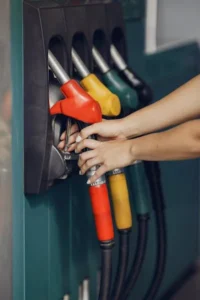
Refilling is not enough. To maintain pump health in your pressure washer, watch out for these things:
Monitoring oil levels regularly:
- Check the oil after every use, especially when changing to another type of oil.
- Level adjustments should be made to maintain proper fill levels whenever necessary.
Schedule for oil replacement:
- Set an oil check-up timetable according to how often you use your washer.
- Change this schedule depending on how frequently you operate your power cleaner, rather than sticking to what manufacturers recommend as a starting point.
Precautions and Considerations
When going for an alternative pressure washer pump oil, some factors must be thought about. These include:
- Machine Warranty: Home substitutes may nullify warranty terms on power cleaners if they are not approved by their respective producers.
- Potential Damage to Pump Components: Other substitutes, for instance, vegetable oil or motor oil, might not provide sufficient lubrication and security for high-pressure environments. Consequently, there can be damage to or wear away of pump components.
- Compatibility with Seals and Gaskets: Some other substitutes may not work well with the seals and gaskets of your pressure washer; hence, over time, they may cause leaks or be destroyed.
- Environmental Impact: Used oil must always be disposed of in the right way to avoid pollution.
Compatibility with Pressure Washer Models
Different pumps use different kinds of oils. Find out whether the substitute also fits into your pressure washer model.
- Compatibility with Pressure Washer Pump Type: The use of substitutes may not produce good results on all forms of axial or triplex pumps. Look at the manufacturer’s recommendation for your specific type of pump before using a substitute.
- Maintenance and Cleaning Requirements: There are some recalibrations that you will need to do when cleaning your machine so it doesn’t get damaged by some substitutes.
Manufacturer Recommendations and Warranty Considerations
Using an incorrect oil that is not recommended could lead to the cancellation of the warranty. You should therefore always look at the manufacturer’s instructions before considering any changes in what you want to have as a substitute for this product that is found in many homes today.
- Maintaining Warranty Coverage: Go by what is recommended by its manufacturer regarding regular maintenance activities, including changing oils, so that you are sure about the insurance cover on it if it gets spoiled or anything breaks down.
- Proper Use of Substitutes: If something else than these may be used, then ensure that they meet the viscosity requirements set above by the makers. Keep careful records as you do oil changes because they might come in handy someday, especially if their proof will be needed as part of the warranty claim document for replacement claims on goods offered through us as suppliers.
Potential risks and precautions to avoid damage
Inappropriate oil selection can result in leakages, equipment wear, and decreased output. Play safe and follow the right procedures as required.
- Risk of Damage to Pump Components: For example, certain oils, like vegetable or motor oil, do not offer enough lubrication and protection in high-pressure environments, thus leading to damage to or wearing out of pump parts.
- Proper Oil Levels and Viscosity: The wrong viscosity grade can cause damage to any pump that is filled with the wrong substitute oil.
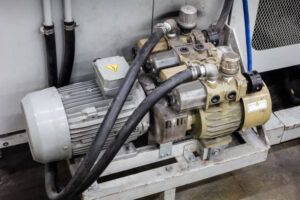
Troubleshooting
Here are a few steps you can take if something goes wrong:
- Check the oil level in your machine and ensure it falls within the correct range.
- Review the viscosity grade of the oil you are using on this machine, and then make sure that it is compatible with your model.
- If there’s anything other than these that may be used as a substitute for this product, then it must meet all manufacturer recommendations regarding both viscosity and compatibility issues.
- Inspect for leaks or damages on such parts of this machine as pumps, among others.
Conclusion
The use of pressure washer pump oil substitutes may provide convenience and even some cost reductions. However, it is important to weigh these advantages against potential risks and the importance of proper maintenance.
Remember, just like regular maintenance can elongate your car’s lifespan, a little care in choosing and applying an alternative will go a long way in preserving the condition of your pressure washer.
Just as with cars, it is always best to follow the manufacturer’s guidelines for oil and maintenance rather than shortcuts in the long run. The future cleanings will be more efficient; you will avoid expensive repairs and have a well-maintained DIY tool standing next to you.
FAQs
- Can I use any type of oil as a substitute for pressure washer pump oil?
Ans: Not every kind of oil might be a suitable substitute for pressure washer pump oil. High-pressure-specific oils should be chosen to guarantee proper lubrication and the functioning of pumps.
- How often should I change the oil in my pressure washer pump if using a substitute?
Ans: The frequency at which the user changes his or her washing device’s engine alters depending on several factors, like how much is used, how one works under what conditions, and what alternative he or she prefers. However, general recommendations suggest checking or replacing every 50–100 working hours or according to the producer’s instruction manual, where applicable.
- Will using a substitute void the warranty on my pressure washer?
Ans: This therefore calls upon everyone to go through manufacturer guidelines as well as warranty terms before they decide to use unapproved alternatives. In some cases, warranty claims aren’t valid after applying them, except when recommended types are employed by clients for better performance purposes, hence maintaining guarantees.
- What are the indications that I should change my pressure washer pump’s oil?
Ans: Signs that suggest the need for an oil change include a higher operating temperature, strange sounds, poor pump operation, and foreign substances in the oil. Regularly inspecting and maintaining the condition of the oil will help prevent possible damage to your pump.
- Can I mix different oils or substitutes in my pressure washer pump?
Ans: Usually, it is not advisable to blend various oils or substitutions unless otherwise stated by the manufacturer. Lotion with contrasting formulas or viscosity levels can compromise lubrication and pump functioning, causing severe harm.
- Are there any preferred brands or products as a substitute for pressure washer pump oil?
Ans: Some reputable firms produce replacements specifically designed for pressure washer pumps. Products that have been recommended by a power washer maker or those marked out for use in high-pressure situations are recommended.
- Will use a substitute affect how well my pressure washer works or how long it lasts?
Ans: If you use an appropriate substitute that meets the manufacturer’s specifications, then it should not significantly affect performance or lifespan. However, using an inappropriate substitute or neglecting proper maintenance can cause premature failure and damage to your pump.
- Are there any environmental considerations when choosing a substitute for pressure washer pump oil?
Ans: Yes, environmental factors matter when selecting a replacement. Choose biodegradable alternatives to minimize environmental impacts and comply with local regulations.
- Can I use cooking oil as a pressure washer pump replacement other than household items like this?
Ans: It is not advisable to utilize household goods such as cooking oil instead of buying a specific type of lubricant needed for your pumping mechanism. These kinds of oils might be unable to offer sufficient lubrication under the extreme pressures and temperatures experienced while running these types of pumps, leading to their breakdown.
- How do I determine what viscosity grade should be used in place of oil for my pressure washer pump?
Ans: To identify the required viscosity grade applicable to your machine, consult either its manual or the manufacturer’s guidelines’ booklets. An impostor who has a viscosity grade that suits high-pressure situations ensures adequate lubrication of the pump.
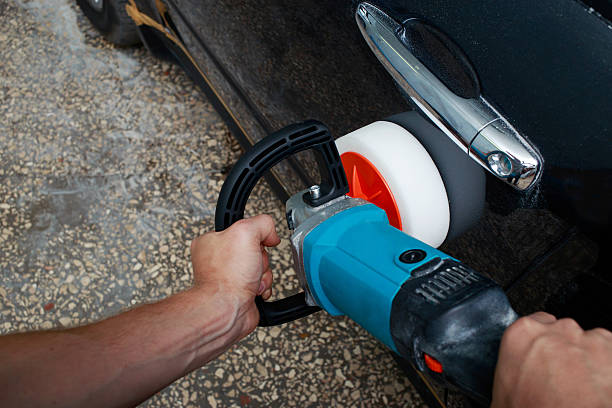










Leave a Reply